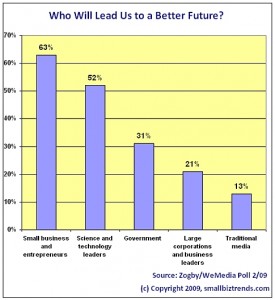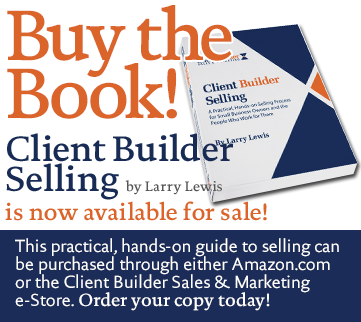The “Small Business Ideal”
While attending the University of Virginia, Larry Lewis (the founder of Client Builder Sales & Marketing) was introduced to the extensive writings of Thomas Jefferson, the author of the Declaration of Independence and the third president of the United States of America. Jefferson was one of the nation’s great thinkers and in the 1780s he extolled the virtues of the “Agrarian Ideal” – the idea that the developing nation was best served by an economy comprised primarily of independent family farms.
Jefferson believed that farming was a noble profession because it kept people out of the corrupt cities, close to the soil and closer to God. He envisioned common farmers as the bedrock of a democratic society – simple, honest, self-reliant individuals who worked their small farms with the help of their families.
In contrast to the common farmer, Jefferson feared that the unlimited expansion of commerce and industry would lead to the growth of a class of wage laborers who relied on others for income and sustenance. He was afraid that these workers would no longer be independent voters. Such a situation, Jefferson worried, would leave the American people vulnerable to political subjugation and economic manipulation.
Over time, the agrarian ideal became nothing more than a romantic myth as America’s economy became more industrialized and the American lifestyle moved away from its agrarian roots. However, despite the fact that our nation is no longer an agrarian society, we believe that the agrarian ideal is still alive and well in the form of small businesses.
A small business is defined as an enterprise having fewer than 500 employees. Today, according to Forbes magazine, there are almost 28 million small businesses. Over 50% of the working population works in a small business and 65% of the net new jobs created since 1995 have been generated by small businesses.
We believe that small businesses are better places to work. They tend to be more community minded and they provide their employees with a better work environment. Like Jefferson, we believe that our nation is better off when the majority of its citizens are self-employed or work for small businesses.
A Family of Entrepreneurs
 Larry Lewis grew up in a family of entrepreneurs. His maternal grandfather was a family physician who practiced out of his home. His grandmother worked with him as his nurse and bookkeeper. Larry’s father started his own HVAC distribution business and managed it for almost twenty years before selling it to a much larger regional competitor. His mother is an antique dealer who is still active in her business at the youthful age of 78. Larry’s youngest sister has her own dance studio and his middle sister works with her husband in a family-owned HVAC business that will soon be passed on to his oldest nephew, the third generation in the business.
Larry Lewis grew up in a family of entrepreneurs. His maternal grandfather was a family physician who practiced out of his home. His grandmother worked with him as his nurse and bookkeeper. Larry’s father started his own HVAC distribution business and managed it for almost twenty years before selling it to a much larger regional competitor. His mother is an antique dealer who is still active in her business at the youthful age of 78. Larry’s youngest sister has her own dance studio and his middle sister works with her husband in a family-owned HVAC business that will soon be passed on to his oldest nephew, the third generation in the business.
Larry grew up in his father’s business and worked for him from the age of ten until age twenty-five. In that business he did everything from managing the warehouse and driving a truck, to counter sales and overseeing the installation of the company’s first computer system. It was here that he came to realize just how important sales and marketing skills were to the typical small business. While good products and services were important, the success or failure of the businesses they sold to typically hinged on the business owners ability to sell.
In order to differentiate their company from all of the other distributors in the area that essentially sold the same stuff that they did, Larry’s fathers company showed their customers how to be better businessmen. They provided classes to the business owners who bought from them on sales and marketing topics. They also provided workshops for their technicians on how to install and repair heating and cooling equipment. They helped them with advertising and provided technical support.
The Lawsuit that Led to a Career in Sales
Soon after Larry graduated from the University of Virginia and went to work in his father’s business full time, his father was sued. A lawyer who had allegedly purchased a furnace from one of our dealers experienced a fire in his basement, and he attributed the fire to the furnace and it’s faulty installation. In a products liability case, everyone in the chain of distribution is potentially liable and the lawyer sued everyone from the manufacturer on down to the dealer who installed it. Unfortunately, this included our Larry’s company as the middle-man.
The lawyer explained to Larry and his father that if they chose to fight the lawsuit, they would certainly win. However, the cost of litigation was likely to be two or three times more than what the plaintiff was willing to accept in settlement. Larry’s father made the economic decision to settle the case. Idealistic (and maybe a bit naïve) Larry vowed to become a lawyer so that he could make the world a better place for small business people like his father.
Although he excelled in law school and as a trial lawyer, it only took four short years, before coming to the conclusion that his father was right to have settled. The last place a small businessman wants to be is engaged in a lawsuit, especially one that goes to trial. He quit his law practice and went into sales. Eventually his desire to make the world a better place for small businesses beckoned him to open his own sales training business.
Helping Small Businesses Succeed
What he couldn’t do as a lawyer, he was able to do as a sales trainer. For fourteen of the past eighteen years Larry and his company has helped fledgling small businesses grow into successful, established companies. Several of his clients that were working out of their basements with just a handful of employees when he met them eighteen years ago are now millionaires with upwards of fifty people working for them. They are still his clients today, and their success is great source of pride and satisfaction.
Similarly, the salespeople that sat in his training sessions eighteen years ago, who paid attention and put his lessons into practice are no longer mere salespeople. Today they are Vice-Presidents of Sales or business owners in their own right. As Larry’s company has expanded and his network of authorized Client Builder Selling sales coaches and trainers continues to expand, the company remains committed to helping small businesses succeed and giving them the tools and training they need to create EPIC improvement in sales performance.

